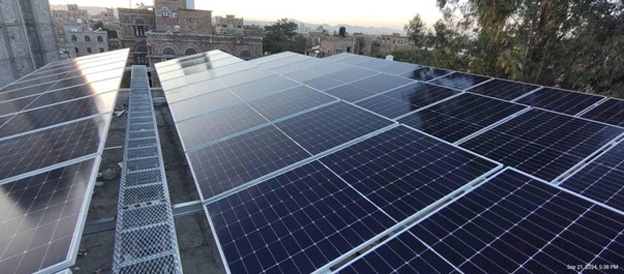 2 January 2025, Sana’a, Yemen – More than 50% of homes in Yemen rely on solar power, a vital energy source in a country that has faced almost a decade of conflict and disruptions to its power grid.
2 January 2025, Sana’a, Yemen – More than 50% of homes in Yemen rely on solar power, a vital energy source in a country that has faced almost a decade of conflict and disruptions to its power grid.
With support from WHO and other partners, hospitals and other health facilities are increasingly turning to solar as a sustainable energy source.
Throughout the conflict and ensuing humanitarian crisis, WHO, with the support of the World Bank and other partners, has provided monthly supplies of emergency diesel fuel to more than 100 hospitals to power generators so that essential services can be delivered to vulnerable communities but the supplies, which exceed 7 million litres of fuel every year, only partially meet the needs of facilities.
Solar energy stands out as a sustainable solution for Yemen’s healthcare sector, with the country enjoying over 3,000 hours of clear skies annually. By harnessing this abundant resource, hospitals can reduce their dependence on fossil fuels and improve their resilience to power disruptions.
WHO Representative to Yemen Dr Arturo Pesigan explained the organization’s approach: “With support from the WHO Centre for Environmental Health Action (CEHA), the WHO Country Office has initiated pilot projects in several hospitals to introduce solar power”.
Al Rawda Maternity and Children’s Hospital in Sana’a serves over 62,000 people and sees 360 patients daily. Thanks to WHO’s intervention, solar power now meets 80% of the hospital’s surgical department energy needs. Dr. Sukainah Alkebsi, the hospital’s director, shared, “This has transformed how we operate, ensuring uninterrupted surgeries even during power outages. We hope this vital support continues.”
The Director of Al Rawda Hospital Dr Sukainah Alkebsi described the impact of WHO’s intervention: “We serve a large population, and WHO support of the surgical operations department has resulted in 80% of the department’s energy needs being sourced from solar. We hope this support will continue.”
Yemen faces intensifying climate challenges, including rising temperatures, reduced rainfall, and more extreme weather. In 2024, flooding impacted over 500,000 people, while persistent outbreaks of climate-sensitive diseases like cholera, dengue, and malaria underscore the urgent need for adaptation.
The impacts of climate change are already being felt. Flooding affected over 500 000 people in 2024; Cyclone Tej caused an estimated US$ 570 million in economic losses in 2023, and the country has faced persistent outbreaks of climate-sensitive diseases such as cholera, dengue and malaria.
In response, WHO is ramping up collaborations with Yemen’s health, environment, and water ministries to strengthen health sector resilience. Solar projects, training health workers, and community awareness campaigns are pivotal to these efforts, enabling facilities to better withstand climate shocks.
Learn more:








